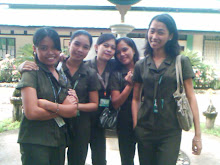Respondents: 4th year students
Total No. of Students: 250
No. of Respondents: 46
No. of Students to be trained: 46
No. of Comp. Unit: 5
Available OS (Operating System: Windows XP
Name of Group: BorjGroup
Team leader: Rhea S. Paglinawan

Writer: Welvie G. Tupas

Blogger: Reychell C. dela Torre

Photographer: Jenny T. Sagal

Trainors: Linlie R. Libo-on & Analyn L. Calaunan


ICT: The Future of Education
Access to the Internet, mobile phones, and television can inspire unparalleled creativity, as after reading, watching or receiving information, users/viewers can then decide to create their own content.
In fact, the old Internet, where we simply were passive participants or readers, is slowly fading away. We now have Web 2.0: the interactive, collaborative nature of the Internet based on contribution, creation and collaboration.
The new Internet
Blogs, wikis, podcasts, video/photo sharing, social networking and software services bring about “social learning” and information of bigger proportions. Gone are the days when we have to content ourselves with the available books in the school library. Now, students can decide on which information to acquire or use.
The Web is now:
- Participative – a good example is the book reviews posted by users themselves in Amazon.com
- Pro-sumer - when customers help create the product sold to them, like viewers and bloggers creating their own superstar in American Idol
- Collaborative - authorities like Brittanica are giving way to Wikipedia, where all users have transparent and cooperative relationships where they can openly edit the content
Here are the ways these changes the world of educating our high school students:
- From Authority to Transparency
- From Teacher as Expert to Teacher as Facilitator
- From Classroom Lecture to Going Beyond
- From Passive to Passionate Learning
- From Publication to Conversation
- From Formal Schooling to Lifelong Learning

0 comments:
Post a Comment